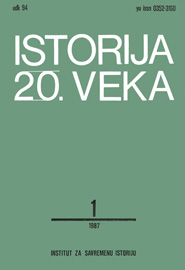DOKTRINA „NARODNO DEMOKRATSKE” DRŽAVE
THE DOCTRINE OF A „PEOPLE’S-DEMOCRATIC STATE”
Author(s): Marija ObradovićSubject(s): Political history, Recent History (1900 till today), Government/Political systems, History of Communism
Published by: Institut za savremenu istoriju, Beograd
Keywords: People's democratic state; doctrine; communism; peasant and national question; class struggle;
Summary/Abstract: The doctrine of a „people’s-democratic” state developed as an ideological rationalization as the instrumental policy of social democratic and communist parties, i.e. as the strategy and tactics of their struggle for power. It's founder can be considered to he Lasalle and its most eminent representatives V. I. Lenin, Mao Tsetuing, Georgi Dimitrov, Matijaš Rakoši, Boleslav Bjerut and other communist leaders in East European countries, while in Yugoslavia a special contribution to its elaboration was made by Moša Pijade and Edvard Kardelj. The basic element of this doctrine comprises the tactics of linking „peasant and national questions with the class struggle of the proletariat”, and in accordance with this the unification of the political interests of peasants, workers and „progressive intellectuals”. Thus slogans about a „united front”, a „people’s front” and an „anti-imperialistic front” arose. The people’s democratic state was always defined as a „transitional and mixed” form of state which had to fill the historical space between a victorious „general people’s revolution” and a future socialist state, i.e. the dictatorship of the proletariat. The legitimacy of the „leading role” of the communist party in the political system of a people's democracy was derived from the political formula of the „general people’s” and ,,general national” character of the communist party which there forehead to be the „leader” of the people’s-democratic revolution. The conception of people’s democracy did not attempt to tackle the question of domination in the political sphere of society, because neither in the theoretical sense, and still less in the practical, did it contribute to the differentiation of the political structure or the secularization of political culture. In this lies the basis of its historical limitations.
Journal: Istorija 20. veka
- Issue Year: 1987
- Issue No: 1
- Page Range: 135-161
- Page Count: 27
- Language: Serbian

